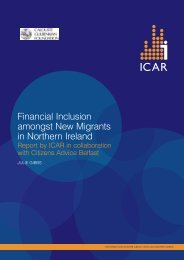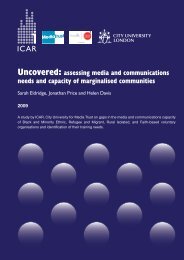Navigation guide Refugee populations in the UK: Algerians - ICAR
Navigation guide Refugee populations in the UK: Algerians - ICAR
Navigation guide Refugee populations in the UK: Algerians - ICAR
Create successful ePaper yourself
Turn your PDF publications into a flip-book with our unique Google optimized e-Paper software.
Introduction<br />
The Algerian population <strong>in</strong> Brita<strong>in</strong> is poorly known and little understood <strong>in</strong> <strong>the</strong> wider British community. Until<br />
<strong>the</strong> early 1990s, <strong>the</strong>re were relatively few <strong>Algerians</strong> <strong>in</strong> <strong>the</strong> <strong>UK</strong>. Over <strong>the</strong> last ten years, particularly s<strong>in</strong>ce <strong>the</strong><br />
escalation of <strong>the</strong> conflict <strong>in</strong> Algeria from 1992 onwards, <strong>the</strong> number of <strong>Algerians</strong> has grown significantly.<br />
Even though this population rema<strong>in</strong>s small compared to more established migrant and refugee groups <strong>in</strong> <strong>the</strong><br />
<strong>UK</strong>, it is extremely diverse. Develop<strong>in</strong>g events <strong>in</strong> Algeria have provoked <strong>the</strong> departure of a number of very<br />
different groups of people, many of whom are represented <strong>in</strong> <strong>the</strong> population resident <strong>in</strong> <strong>the</strong> <strong>UK</strong>.<br />
Although <strong>the</strong>re are a number of Algerian associations <strong>in</strong> <strong>the</strong> <strong>UK</strong>, <strong>the</strong>se are not necessarily representative of<br />
<strong>the</strong> population as a whole, and although bonds of solidarity between <strong>in</strong>dividuals are extremely strong, <strong>the</strong>re<br />
is little sense of a unified ‘community’. Indeed, some sections of <strong>the</strong> Algerian population are characterised<br />
more by mutual suspicion than by solidarity. This concern is not helped by <strong>the</strong> widespread ignorance of <strong>the</strong><br />
situation <strong>in</strong> Algeria amongst <strong>the</strong> <strong>UK</strong> population as a whole. In general <strong>Algerians</strong> <strong>in</strong> Brita<strong>in</strong>, particularly recent<br />
arrivals, are extremely isolated s<strong>in</strong>ce many of <strong>the</strong>m lack both a cohesive community and a sympa<strong>the</strong>tic host<br />
population.<br />
About this <strong>guide</strong><br />
This navigation <strong>guide</strong> is focused on Algerian refugees and asylum seekers <strong>in</strong> <strong>the</strong> <strong>UK</strong>, though <strong>the</strong> scope of<br />
<strong>the</strong> <strong>guide</strong> is not restricted to those people who have requested or been granted asylum. There is also a<br />
considerable group of undocumented <strong>Algerians</strong> resident <strong>in</strong> <strong>the</strong> <strong>UK</strong> who have ei<strong>the</strong>r been refused asylum or<br />
who, for a variety of reasons, have never applied for <strong>in</strong>ternational protection. In a legal sense, <strong>the</strong>se people<br />
are obviously not refugees, but <strong>the</strong> <strong>guide</strong> will also consider <strong>the</strong>ir situation. There is considerable agreement<br />
that <strong>the</strong> sociological understand<strong>in</strong>g of refugee <strong>populations</strong> must be separated from <strong>the</strong> legal def<strong>in</strong>ition, <strong>in</strong><br />
order to <strong>in</strong>clude <strong>the</strong> category of ‘genu<strong>in</strong>e but unrecognised refugees’. 1<br />
Comments <strong>in</strong> this <strong>guide</strong> on <strong>the</strong> Algerian population will <strong>the</strong>refore be concerned with those <strong>Algerians</strong> who left<br />
Algeria after <strong>the</strong> state of emergency was declared <strong>in</strong> February 1992. Although <strong>the</strong> author recognises that not<br />
all <strong>the</strong>se people are refugees, <strong>in</strong> ei<strong>the</strong>r a legal or a sociological sense, <strong>the</strong> situation of generalised violence<br />
that has persisted dur<strong>in</strong>g <strong>the</strong> state of emergency is likely to have played a role <strong>in</strong> <strong>the</strong>ir decision to leave <strong>the</strong><br />
country. In order to keep term<strong>in</strong>ology free from confusion, <strong>the</strong> <strong>guide</strong> will refer to those people who are not<br />
await<strong>in</strong>g <strong>the</strong> result of an asylum claim, or who have not been recognised as a refugee or granted<br />
Exceptional Leave to Rema<strong>in</strong> (ELR), as ‘migrants’. 2 This should not be taken as a judgement on <strong>the</strong><br />
legitimacy of any claim <strong>the</strong>y may have to refugee status. The <strong>guide</strong> also <strong>in</strong>cludes some <strong>in</strong>formation on <strong>the</strong><br />
small population of <strong>Algerians</strong> who were already resident <strong>in</strong> <strong>the</strong> <strong>UK</strong> when <strong>the</strong> state of emergency was<br />
declared.<br />
This navigation <strong>guide</strong> aims to present a coherent account of <strong>the</strong> situation fac<strong>in</strong>g <strong>Algerians</strong> <strong>in</strong> <strong>the</strong> <strong>UK</strong> through<br />
<strong>the</strong> provision of basic <strong>in</strong>formation and l<strong>in</strong>ks to o<strong>the</strong>r resources.<br />
o Section one briefly exam<strong>in</strong>es <strong>the</strong> historical context of <strong>the</strong> movement of <strong>Algerians</strong> to <strong>the</strong> <strong>UK</strong> and<br />
aims to highlight <strong>the</strong> range of explanations of Algerian history and <strong>in</strong>troduce <strong>the</strong> reader to <strong>the</strong><br />
diversity of material available on this.<br />
1 See, for example, Zolberg, A. R., Suhrke, A. and Aguayo, S. (1989) Escape from violence: Conflict and <strong>the</strong> refugee<br />
crisis <strong>in</strong> <strong>the</strong> develop<strong>in</strong>g world. Open University Press, New York.<br />
2 ELR status has now been replaced by a new ‘humanitarian protection’ status. More <strong>in</strong>formation about this change is<br />
available from <strong>the</strong> <strong>Refugee</strong> Council’s news brief<strong>in</strong>g and <strong>the</strong> Home Office [accessed 5 May 2004].<br />
<strong>Navigation</strong> <strong>guide</strong> to refugee <strong>populations</strong>: <strong>Algerians</strong><br />
©<strong>ICAR</strong> 2004, moral rights Michael Collyer<br />
5

















